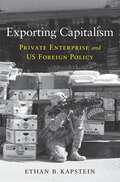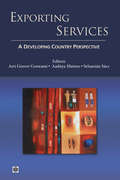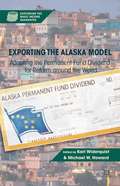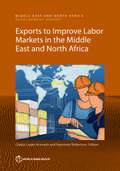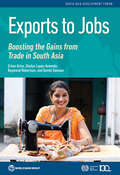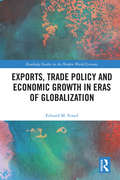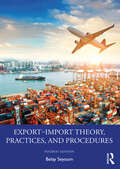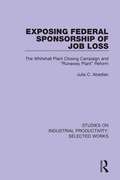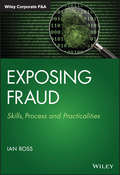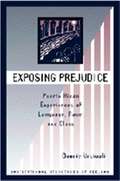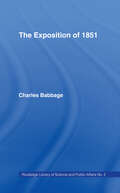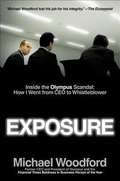- Table View
- List View
Exporting American Culture
by Joseph L. Badaracco Jr. Jerry UseemA large entertainment company, extensively criticized for producing violent, offensive, and anti-social material, is considering whether to sell its material to a semi-illegal operation that is beaming satellite TV into Turkey. The opportunity raises many questions about cultural sensitivities and the concept of American cultural imperialism around the globe, especially in the traditional Muslim Middle East. The young executive responsible for the deal wonders if his company will be perceived as a "Western vulture."
Exporting Capitalism: Private Enterprise and US Foreign Policy
by Ethan B. KapsteinThe first comprehensive history of America’s attempts to promote international development by exporting private enterprise, a story marked by frequent failure and occasional success. Foreign aid is a primary tool of US foreign policy, but direct financial support and ventures like the Peace Corps constitute just a sliver of the American global development pie. Since the 1940s, the United States has relied on the private sector to carry out its ambitions in the developing world. This is the first full account of what has worked and, more often, what has failed in efforts to export American-style capitalism. Ethan Kapstein draws on archival sources and his wide-ranging experience in international development to provide penetrating case studies from Latin America and East Asia to the former Soviet Union, Afghanistan, and Iraq. After WWII the Truman and Eisenhower administrations urged US companies to expand across the developing world. But corporations preferred advanced countries, and many developing nations, including Taiwan and South Korea, were cool to foreign investment. The Cold War made exporting capitalism more important than ever, even if that meant overthrowing foreign governments. The fall of the Soviet Union brought new opportunities as the United States promoted privatization and the bankrolling of local oligarchs. Following the invasions of Afghanistan and Iraq, the United States had blank slates for building these economies, but ongoing conflict eroded such hopes. Kapstein’s sobering history shows that private enterprise is no substitute for foreign aid. Investors are often unwilling to put capital at risk in unstable countries. Only in settings with stable governments and diverse economic elites can private enterprise take root. These lessons are crucial as the United States challenges China for global influence.
Exporting Livability: Investing in New Urban Centers
by John D. Macomber Essie AlamsyahCan Singapore urban design, policy continuity, and system of laws be exported outside of Singapore to accelerate the effective development of new urban agglomerations? Nina Yang, CEO of Sustainable Urban Development at Ascendas-Singbridge, a large real estate company based in Singapore, was considering whether to build residential or commercial space in one of its sustainable urban development projects, Sino-Singapore Guangzhou Knowledge City. Could such a long-gestation urban development project be commercially viable? What were the partnership issues working with the Guangzhou government? Could Singapore livability concepts, planning expertise, safety for capital, and comfort for multinational corporations be successfully exported outside of Singapore into large urban agglomerations on a repeated basis?
Exporting Services
by Aaditya Mattoo Sebastián Sáez Arti Grover GoswamiThe services sector is key to economic growth, competitiveness, and poverty alleviation. In addition, services exports have become an important part of export diversification strategies for some developing countries. Although industrial countries are still the largest exporters of services, a number of developing countries are among the most dynamic. The share of developing countries in world services exports increased from 14 percent in 1990 to 21 per in 2008. In fact, service sector exports of a number of developing countries are growing faster than their goods exports. This book aims at identifying factors that helped developing countries succeed in exporting services and provides lessons for others. The book focuses on how did developing countries succeed in increasing key services exports and what strategies were successful for services exports as well as what strategies did not deliver the expected results. The framework for analyzing the determinants of services trade is set through an econometric model which is then applied country case studies. Given the paucity of services trade statistics, case study approach is found to be a successful way of dealing with policy specific determinants. . Acknowledging the data constraints and weaknesses, the book brings out the determinants of trade in services by analyzing the experiences of Brazil, Chile, Egypt, India, Kenya, Malaysia and Philippines. These case studies help identify policy frameworks that have been successful as well as policy environments that have not delivered expected results. This book is for trade specialists and policymakers interested in improving their understanding of the fundamentals as well as specific factors that influenced services exports performance. It is a useful tool for governments to design successful trade and promotion strategies, as well as sound domestic policy reforms in the service sector.
Exporting the Alaska Model
by Karl Widerquist Michael W. HowardThis timely book examines how the "Alaska model" can be adapted for use elsewhere, examining issues of implementation and showing that this model can be employed even in resource-poor areas in the industrialized and in the industrializing world.
Exports to Improve Labor Markets in the Middle East and North Africa (MENA Development Report)
by Raymond Robertson Gladys Lopez-AcevedoIn the Middle East and North Africa (MENA), trade liberalization measures have coincided with stable economic growth, and GDP per capita growth has surpassed that of other developing regions. However, MENA's labor-market outcomes--such as average wage levels, informality rate, and female labor force participation--continue to underperform. Why has rising trade failed to produce better labor market outcomes in low- and middle-income countries in the region? 'Exports to Improve Labor Markets in the Middle East and North Africa' focuses on the impact of trade policy on trade-flows and their relationship with local labor market outcomes in three low- and middle-income countries--the Arab Republic of Egypt, Morocco, and Tunisia. Given their idiosyncratic labor markets, export diversification, and trade policy history, these three countries other important lessons for economic development in the region. Policy makers and stakeholders can use these findings to design policies to improve the chances that higher trade flows will deliver better labor market outcomes and ensure that the benefits are more equally shared. 'This report, led by Gladys Lopez-Acevedo and Raymond Robertson, pushes forward the frontier of knowledge about the relationship between trade and the labor market in MENA. Although focusing on three countries (the Arab Republic of Egypt, Morocco, and Tunisia), it gives us broader lessons on how to solve the apparent puzzle of greater exposure to trade not being followed by greater labor market outcomes in the region. It points out, among other factors, how market segmentation by gender shapes the effects of trade shocks like higher exports. Policy makers in the region will definitely benefit from the evidence and analysis conveyed by the report on how to turn trade integration into a lever for shared prosperity.' --Otaviano Canuto, Senior Fellow at the Policy Center for the New South, and former Vice President of the World Bank 'This timely report attempts to understand why trade expansion did not produce the desired improvements in labor market outcomes in three non-oil-exporting countries in MENA. The main reason for the weak link between trade expansion and widely shared labor market improvements appears to be the segmented nature of labor markets in the three countries, by gender as well as by formality status. In Morocco and Tunisia, the highly segmented labor markets along gender lines, in combination with the concentration of trade in male-dominated capital-intensive sectors, led to few employment benefits accruing to women. In Egypt, the limited impact of trade on formal employment is attributable to the small size of the nation’s export sector and its lack of integration with the rest of the economy. These findings are critical to understanding how barriers to widely shared prosperity can be tackled in the region.' --Ragui Assaad, Professor, Humphrey School of Public Affairs, University of Minnesota
Exports to Jobs: Boosting the Gains from Trade in South Asia (South Asia Development Forum)
by Raymond Robertson Gladys Lopez-Acevedo Erhan Artuc SamaanSouth Asia has grown rapidly with significant reductions in poverty, but it has not been able to match the fast-growing working age population, leading to lingering concerns about jobless growth and poor job quality. Could export growth in South Asia result in better labor market outcomes? The answer is yes, according to our study, which rigorously estimates—using a new methodology—the potential impact from higher South Asian exports per worker on wages and employment over a 10-year period. Our study shows the positive side of trade. It finds that increasing exports per worker would result in higher wages—mainly for better-off groups, like more educated workers, males, and more-experienced workers—although less-skilled workers would see the largest reduction in informality. How can the benefits be spread more widely? Our study suggests that scaling up exports in labor-intensive industries could significantly lower informality for groups like rural and less-educated workers in the region. Also, increasing skills, and participation of women and young workers in the labor force could make an even bigger dent in informal employment. The region could achieve these gains by: (i) boosting and connecting exports to people (e.g., removing trade barriers and investment in infrastructure); (ii) eliminating distortions in production (e.g., by more efficient allocation of inputs); and (iii) protecting workers (e.g., by investing in education and skills).
Exports, Trade Policy and Economic Growth in Eras of Globalization (Routledge Studies in the Modern World Economy)
by Edward M. FeaselThis book provides an excellent resource for understanding the forces in international trade liberalization over two centuries that have brought us to this point, where the successes, setbacks and the countervailing forces now vie for the public's mind and support: the outcome of which will determine the future progress of increased globalization, or lack thereof. The book also examines whether trade policy has indeed promoted exports in the vast number of countries which increasingly look to trade agreements to gain a competitive edge, and to what extent export-driven growth has been an important force in advancing economic development around the world. In doing so, the book examines one of the most controversial issues in economic development: the promotion and significance of export-led growth.
Export–Import Theory, Practices, and Procedures
by Belay SeyoumThis book remains the sole export–import textbook aimed squarely at the academic audience. Discussing theoretical issues in depth, while maintaining a practical approach, it offers a comprehensive exploration of import procedures and export regulations. In addition to updated cases, this new edition includes: New major developments in bilateral and regional trade agreements Changes to INCOTERMS 2010 Coverage of the role of e-commerce Expanded updates on methods of payment, export pricing, and government export finance This clearly written and comprehensive textbook will ground students in theory and prepare them for the realities of a career in this fast-moving field. Suitable for upper-level undergraduates and postgraduates of international trade, the book stands alone in its blend of conceptual frameworks and cogent analysis. A related website, filled with export–import resources, opinion pieces, cases, and the latest news is located at: www.export-importtradecenter.com.
Exposed: How Revealing Your Data and Eliminating Privacy Increases Trust and Liberates Humanity
by Ben MalisowDiscover why privacy is a counterproductive, if not obsolete, concept in this startling new book It's only a matter of time-- the modern notion of privacy is quickly evaporating because of technological advancement and social engagement. Whether we like it or not, all our actions and communications are going to be revealed for everyone to see. Exposed: How Revealing Your Data and Eliminating Privacy Increases Trust and Liberates Humanity takes a controversial and insightful look at the concept of privacy and persuasively argues that preparing for a post-private future is better than exacerbating the painful transition by attempting to delay the inevitable. Security expert and author Ben Malisow systematically dismantles common notions of privacy and explains how: Most arguments in favor of increased privacy are wrong Privacy in our personal lives leaves us more susceptible to being bullied or blackmailed Governmental and military privacy leads to an imbalance of power between citizen and state Military supremacy based on privacy is an obsolete concept Perfect for anyone interested in the currently raging debates about governmental, institutional, corporate, and personal privacy, and the proper balance between the public and the private, Exposed also belongs on the shelves of security practitioners and policymakers everywhere.
Exposed: The Toxic Chemistry of Everyday Products and What's at Stake for American Power
by Mark SchapiroThe United States was once the pioneer of new approaches to environmental protection. In the 1970s and 1980s an American mix of scientific rigor and legal muscle gave birth to a body of environmental regulations and laws that was seen as a model around the world. But no more; leadership has switched. The European Union is asserting new priorities that are far more protective of citizens' health and the environment than those in the United States and they have the economic muscle to back them up.
Exposed: Why Our Health Insurance Is Incomplete and What Can Be Done about It
by Christopher T. RobertsonDemocrats and Republicans fight endlessly over health care, but neither side disputes one of the system’s most basic flaws: the foisting on patients of substantial costs through deductibles, copayments, and coinsurance. Marshalling a decade of research, Christopher Robertson shows why this model is dysfunctional and offers ideas for improvement.
Exposing Federal Sponsorship of Job Loss: The Whitehall Plant Closing Campaign and "Runaway Plant" Reform (Studies on Industrial Productivity: Selected Works #1)
by Julia C. AbedianOriginally published in 1995, this book explores a number of subjects of significance for labor and economic policy, especially the role of U. S. tax policy in the relocation of jobs from the contintental USA to Puerto Rico. The book demonstrates the problems for the USA because of inadequate adjustment policies to protect the interests of communities and workers when plants close and production is relocated. It disproves the myth that markets will take fcare of workers and communities, showing that basic economics is concerned with market forces and not with equity, environmental and worker protections. The Whitehall plant closing case is documented and the economic and political context analyzed which caused that case to be instructive for broader economic and labor policy purposes. In a new age of American Protectionism, this book has enduring relevance.
Exposing Fraud
by Ian RossForeword by James D. Ratley, CFE, President and CEO, Association of Certified Fraud Examiners Beyond the basics--tools for applied fraud management In Exposing Fraud: Skills, Process, and Practicalities, anti-fraud expert Ian Ross provides both ideas and practical guidelines for applying sound techniques for fraud investigation and detection and related project management. The investigative principles in this book are truly universal and can be applied anywhere in the world to deal with any of the range of fraud types prevalent in today's business environments. Topics covered include cyber fraud, the psychology of fraud, data analysis techniques, and the role of corporate and international culture in criminal behavior, among many others. Ensure an optimal outcome to fraud investigations by mastering real-world skills, from interviewing and handling evidence to conducting criminal proceedings. As technologies and fraud techniques become more complex, fraud investigation must increase in complexity as well. However, this does not mean that time-tested strategies for detecting criminals have become obsolete. Instead, it means that a hands-on approach to fraud detection and management is needed more than ever. The book does just that: Takes a unique practical approach to the business of detecting, understanding, and dealing with fraud of all types Aids in the development of key skills, including conducting investigations and managing fraud risk Covers issues related to ethically and efficiently handling impulsive and systemic fraud, plus investigating criminals who may be running multiple scams Addresses fraud from a global perspective, considering cultural and psychological factors that influence fraudsters Unlike other fraud investigation books on the market, Exposing Fraud develops the ethical and legal foundation required to apply theory and advice in real-world settings. From the simple to the complex, this book demonstrates the most effective application of anti-fraud techniques.
Exposing Prejudice
by Bonnie UrciuoliPuerto Ricans in the United States, like other migrant minorities, face an array of linguistic judgments. They are told they don’t succeed because they don’t speak English. They are told their English is "impure” or "broken” because it has been "mixed” with Spanish. They are told that they sound inarticulate and that if they speak "correct” English, with no sign of Spanish influence-most particularly with no accent, they will get better jobs. In short, Puerto Ricans in the United States are told that the origins of their economic and social problems are linguistic and can be remedied through personal effort, when in fact their fundamental problems stem from racial and class exclusion. Concepts like "mixed” or "broken” languages, and "good” and "bad” English are cultural constructions and therefore are about more than language. In the Puerto Rican experience of devaluation and prejudice in the United States, the institutionalization of racial exclusion and class location are mapped onto English and Spanish in complex and highly politicized ways. Formal linguistic studies of bilingualism rarely engage this process in a significant way. But the place, function, and meaning of cultural constructs within the politicized communicative economy must be understood in terms of the intersections of race, class, and language that shape the lives of working-class Puerto Ricans. Working from ethnographic studies and interviews done on New York’s Lower East Side and in the Bronx, this book examines that intersection in detail.
Exposing Prejudice
by Bonnie UrciuoliPuerto Ricans in the United States, like other migrant minorities, face an array of linguistic judgments. They are told they don't succeed because they don't speak English. They are told their English is "impure" or "broken" because it has been "mixed" with Spanish. They are told that they sound inarticulate and that if they speak "correct" English, with no sign of Spanish influence-most particularly with no accent, they will get better jobs. In short, Puerto Ricans in the United States are told that the origins of their economic and social problems are linguistic and can be remedied through personal effort, when in fact their fundamental problems stem from racial and class exclusion.Concepts like "mixed" or "broken" languages, and "good" and "bad" English are cultural constructions and therefore are about more than language. In the Puerto Rican experience of devaluation and prejudice in the United States, the institutionalization of racial exclusion and class location are mapped onto English and Spanish in complex and highly politicized ways. Formal linguistic studies of bilingualism rarely engage this process in a significant way. But the place, function, and meaning of cultural constructs within the politicized communicative economy must be understood in terms of the intersections of race, class, and language that shape the lives of working-class Puerto Ricans. Working from ethnographic studies and interviews done on New York's Lower East Side and in the Bronx, this book examines that intersection in detail.
Exposing Prejudice
by Bonnie UrciuoliPuerto Ricans in the United States, like other migrant minorities, face an array of linguistic judgments. They are told they don't succeed because they don't speak English. They are told their English is "impure" or "broken" because it has been "mixed" with Spanish. They are told that they sound inarticulate and that if they speak "correct" English, with no sign of Spanish influence-most particularly with no accent, they will get better jobs. In short, Puerto Ricans in the United States are told that the origins of their economic and social problems are linguistic and can be remedied through personal effort, when in fact their fundamental problems stem from racial and class exclusion.Concepts like "mixed" or "broken" languages, and "good" and "bad" English are cultural constructions and therefore are about more than language. In the Puerto Rican experience of devaluation and prejudice in the United States, the institutionalization of racial exclusion and class location are mapped onto English and Spanish in complex and highly politicized ways. Formal linguistic studies of bilingualism rarely engage this process in a significant way. But the place, function, and meaning of cultural constructs within the politicized communicative economy must be understood in terms of the intersections of race, class, and language that shape the lives of working-class Puerto Ricans. Working from ethnographic studies and interviews done on New York's Lower East Side and in the Bronx, this book examines that intersection in detail.
Exposition of 1851: Or Views of the Industry, The Science and the Government of England (Cambridge Library Collection - British And Irish History, 19th Century Ser.)
by Charles BabbagePart of the library of Science and Public Affairs and originally published in 1851, this study relates views of the industry, science and the Government of England in 1851.
Exposure
by Michael WoodfordWhen Michael Woodford was made president of Olympus, he became the first Westerner ever to climb to the top of one of Japan's corporate giants. Unfortunately, soon after, his dream job turned into a nightmare. Woodford learned about a series of bizarre mergers and acquisitions deals totaling $1.7 billion--a scandal that threatened to bring down the entire company if exposed. Just weeks later, he was fired in a boardroom coup that shocked Japan and the business world. Woodford fled the country in fear for his life and went straight to the press--making him the first CEO of a global multinational to blow the whistle on his own company. Now Woodford recounts his almost unbelievable true story and paints a devastating portrait of corporate Japan. "His story is filled with mystery, suspense, and betrayal." --Management Today "A gripping chronicle." --Kirkus Reviews "I had walked into a John Grisham novel." --Michael Woodford
Exposure: How I Went from CEO to Whistleblower
by Michael Woodford“It was no comfort to know that I was making history, for the forced removal of a company president is almost unheard of in Japan. I rose quietly, left the room, and holding my head high, walked back to my office. My main goal was to escape as quickly as possible. The board had seemed scared—why else would they have acted the way they did. But just what were they scared of?” When Michael Woodford was made president of Olympus—the company to which he had dedicated thirty years of his career—he became the first Westerner ever to climb the ranks of one of Japan’s corporate giants. Some wondered at the appointment—how could a gaijin who didn’t even speak Japanese understand how to run a Japanese company? But within months Woodford had gained the confidence of most of his colleagues and shareholders. Unfortunately, soon after, his dream job turned into a nightmare. The trouble began when Woodford learned about a series of bizarre mergers and aquisitions deals totaling $1. 7 billion—a scandal that threatened to bring down the entire company if exposed. He turned to his fellow executives— including the chairman who had promoted him Tsuyoshi Kikukawa—for answers. But instead of being heralded as a hero for trying to save the company, Woodford was met with vague responses and hostility—a clear sign of a cover up. Undeterred, he demanded to be made CEO so he could have more leverage with his board and continue to search for the truth. Then, just weeks after being granted the top title, he was fired in a boardroom coup that shocked Japan and the business world at large. Worried his former bosses might try to silence him, Woodford immediately fled the country in fear of his life and went straight to the press—making him the first CEO of a global multinational to blow the whistle on his own company. Following his dismissal, Woodford faced months of agonizing pressure that at times threatened his health and his family life. But instead of succumbing he persisted, and eventually the men who had ousted him were held to account. Now, Woodford recounts his almost unbelievable true story—from the e-mail that first alerted him to the scandal, to the terrifying rumors of involvement with the Japanese mafia, to the stream of fruitless denials that continued to emanate from Olympus in an effort to cover up the scandal. He also paints a devastating portrait of corporate Japan—an insular, hierarchy-driven culture that prefers maintaining the status quo to exposing ugly truths. The result is a deeply personal memoir that reads like a thriller narrative. As Woodford puts it, “I thought I was going to run a health-care and consumer electronics company, but found I had walked into a John Grisham novel. ” .
Express Scripts: Promoting Prescription Drug Home Delivery (A)
by Jenny Sanford Patrick Rooney John BeshearsThe pharmacy benefit manager (PBM) sector processes prescription drug claims on behalf of companies that offer a prescription drug benefit to their employees. This case follows Bob Nease, Chief Scientist at Express Scripts, as he considers methods to promote home delivery of prescription drugs by mail-a process proven to lower prescription fill error rates, increase cost savings, and improve medication adherence.
Express Scripts: Promoting Prescription Drug Home Delivery (B)
by Jenny Sanford Patrick Rooney John BeshearsThe pharmacy benefit manager (PBM) sector processes prescription drug claims on behalf of companies that offer a prescription drug benefit to their employees. This case follows Bob Nease, Chief Scientist at Express Scripts, as he considers methods to promote home delivery of prescription drugs by mail-a process proven to lower prescription fill error rates, increase cost savings, and improve medication adherence.
Express Scripts: Promoting Prescription Drug Home Delivery (B)
by Jenny Sanford Patrick Rooney John BeshearsThe pharmacy benefit manager (PBM) sector processes prescription drug claims on behalf of companies that offer a prescription drug benefit to their employees. This case follows Bob Nease, Chief Scientist at Express Scripts, as he considers methods to promote home delivery of prescription drugs by mail-a process proven to lower prescription fill error rates, increase cost savings, and improve medication adherence.
Expuestos: Las nuevas reglas del mundo transparente
by Sergio Roitberg«Un libro iluminador sobre cómo manejarnos en un mundo hiperconectado», Andrés Oppenheimer. En las últimas décadas, la vertiginosa sucesión de innovaciones tecnológicas -desde la fabricación de vehículos eléctricos y autónomos hasta la ingeniería genética, pasando por smartphones, redes sociales y aplicaciones- alteró por completo las bases sobre las que la humanidad organizó durante siglos la vida en sociedad. ¿Cómo lidiar con estos cambios, que demuelen a diario todas nuestras certezas? Expuestos nace como una hoja de ruta para entender la actual manera de relacionarnos en el contexto del update permanente y la tendencia a la conectividad total. Ágil y accesible, este libro nos prepara para que el nuevo escenario no nos tome tan desprevenidos y, en lugar de refugiarnos en el miedo, podamos aprovechar las múltiples oportunidades que la tecnología tiene para ofrecernos.
Expulsions
by Saskia SassenSoaring income inequality and unemployment, expanding populations of the displaced and imprisoned, accelerating destruction of land and water bodies: today's socioeconomic and environmental dislocations cannot be fully understood in the usual terms of poverty and injustice, according to Saskia Sassen. They are more accurately understood as a type of expulsion--from professional livelihood, from living space, even from the very biosphere that makes life possible. This hard-headed critique updates our understanding of economics for the twenty-first century, exposing a system with devastating consequences even for those who think they are not vulnerable. From finance to mining, the complex types of knowledge and technology we have come to admire are used too often in ways that produce elementary brutalities. These have evolved into predatory formations--assemblages of knowledge, interests, and outcomes that go beyond a firm's or an individual's or a government's project. Sassen draws surprising connections to illuminate the systemic logic of these expulsions. The sophisticated knowledge that created today's financial "instruments" is paralleled by the engineering expertise that enables exploitation of the environment, and by the legal expertise that allows the world's have-nations to acquire vast stretches of territory from the have-nots. Expulsions lays bare the extent to which the sheer complexity of the global economy makes it hard to trace lines of responsibility for the displacements, evictions, and eradications it produces--and equally hard for those who benefit from the system to feel responsible for its depredations.

